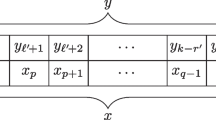Abstract
First Order String Calculus (FOSC), introduced in this paper, is a generalization of First Order Predicate Calculus (FOPC). The generalization step consists in treating the unrestricted strings, which may contain variable symbols and a nesting structure, similarly to the predicate symbols in FOPC. As a logic programming technology, FOSC, combined with a string unification algorithm and the resolution principle, eliminates the need to invent logical atoms. An important aspect of the technology is the possibility to apply a matching of the text patterns immediately in logical reasoning. In this way the semantics of a text can be defined by string examples, which only demonstrate the concepts, rather than by a previously formalized mathematical knowledge. The advantages of avoiding this previous formalization are demonstrated. We investigate the knowledge representation aspects, the algorithmic properties, the brain simulation aspects, and the application aspects of FOSC theories in comparison with those of FOPC theories. FOSC is applied as a formal basis of logic programming language Sampletalk, introduced in our earlier publications.
Preview
Unable to display preview. Download preview PDF.
Similar content being viewed by others
References
Baader, F., Snyder, W.: Unification Theory. Handbook of Automated Deduction, ch. 8. Springer, Berlin (2001)
Černá1, I., Klíma, O., Srba1, J.: On the Pattern Equations. FI MU Report Series, FIMU-RS-99-01 (1999)
Church, A.: Introduction to Mathematical Logic, vol. 1. Princeton University Press, Princeton (1956)
Cicchello, O., Kremer, S.C.: Inducing Grammars from Sparse Data Sets: A survey of Algorithms and Results. Journal of Machine Learning Research 4, 603–632 (2003)
Dzeroski, S., Cussens, J., Manandhar, S.: An Introduction to Inductive Logic Programming and Learning Language in Logic. In: Cussens, J., Džeroski, S. (eds.) LLL 1999. LNCS, vol. 1925, pp. 4–35. Springer, Heidelberg (2000)
Gleibman, A.H.: Knowledge Representation via Verbal Description Generalization: Alternative Programming in Sampletalk Language. In: Workshop on Inference for Textual Question Answering, July 2009, 2005 – Pittsburgh, Pennsylvania, pp. 59–68, AAAI 2005 - the Twentieth National Conference on Artificial Intelligence, http://www.hlt.utdallas.edu/workshop2005/papers/WS505GleibmanA.pdf
Glushkov, V.M., Grinchenko, T.A., Dorodnitcina, A.A.: Algorithmic Language ANALYTIC-74. Kiev. Inst. of Cybernetics of the Ukraine Academy of Sciences (1977) (in Russian)
Griswold, R.E.: The Macro Implementation of SNOBOL4. W.H. Freeman and Company, San Francisco (1972)
Hewitt, C.E.: Description and theoretical analysis (using schemata) of PLANNER: a language for proving theorems and manipulating models in a robot. Technical Report, AI-TR-258, MIT Artificial Intelligence Laboratory (1972)
Jaeger, E., Francez, N., Wintner, S.: Unification Grammars and Off-Line Parsability. Journal of Logic, Language and Information 14, 234–299 (2005)
Jurafsky, D., Martin, J.H.: Speech and Language Processing. An introduction to Natural Language Processing, Computational Linguistics, and Speech Recognition. Prentice-Hall, Englewood Cliffs (2000)
Kleene, S.C.: Mathematical Logic. John Wiley & Sons, Chichester (1967)
Kutsia, T., Buchberger, B.: Predicate Logic with Sequence Variables and Sequence Function Symbols. In: Asperti, A., Bancerek, G., Trybulec, A. (eds.) MKM 2004. LNCS, vol. 3119, pp. 205–219. Springer, Heidelberg (2004)
Lenat, D.B.: From 2001 to 2001: Common Sense and the Mind of HAL. In: Stork, D.G. (ed.) HAL’s Legacy: 2001’s Computer as Dream and Reality. MIT Press, Cambridge (2002)
Lloyd, J.W.: Foundations of logic programming. Artificial Intelligence Series. Springer, New York (1987)
Makanin, G.S.: The Problem of Solvability of Equations in a Free Semigroup. Mat. Sbornik. 103(2), 147–236 (in Russian); English translation in: Math. USSR Sbornik 32, 129–198 (1977)
Markov, A.A.: Theory of Algorithms. Trudy Mathematicheskogo Instituta Imeni V. A. Steklova 42 (1954) (in Russian)
Muggleton, S.H., De Raedt, L.: Inductive Logic Programming: Theory and Methods. Logic Programming 19(20), 629–679 (1994)
Niles, I., Pease, A.: Towards a Standard Upper Ontology. In: Welty, C., Smith, B. (eds.) Proceedings of the 2nd International Conference on Formal Ontology in Information Systems (FOIS 2001), Ogunquit, Maine (2001)
Piaget, J., Inhelder, B., Weaver, H.: The Psychology of the Child. Basic Books (1969)
Plotkin, G.: A note on inductive generalization. Machine Intelligence, vol. 5, pp. 153–163. Edinburgh University Press (1970)
Robinson, J.A.: A Machine-oriented Logic Based on the Resolution Principle. J. ACM 12(1), 23–41 (1965)
Turchin, V.F.: Basic Refal. Language Description and Basic Programming Methods (Methodic Recommendations), Moscow, CNIIPIASS (1974) (in Russian)
Vigandt, I.: Natural Language Processing by Examples. M. Sci. Thesis, Comp. Sci. Dept., Technion, Haifa, 115 p. (1997) (in Hebrew, with abstract in English)
Author information
Authors and Affiliations
Editor information
Editors and Affiliations
Rights and permissions
Copyright information
© 2009 Springer-Verlag Berlin Heidelberg
About this chapter
Cite this chapter
Gleibman, A. (2009). Intelligent Processing of an Unrestricted Text in First Order String Calculus. In: Gavrilova, M.L., Tan, C.J.K., Wang, Y., Chan, K.C.C. (eds) Transactions on Computational Science V. Lecture Notes in Computer Science, vol 5540. Springer, Berlin, Heidelberg. https://doi.org/10.1007/978-3-642-02097-1_6
Download citation
DOI: https://doi.org/10.1007/978-3-642-02097-1_6
Publisher Name: Springer, Berlin, Heidelberg
Print ISBN: 978-3-642-02096-4
Online ISBN: 978-3-642-02097-1
eBook Packages: Computer ScienceComputer Science (R0)




